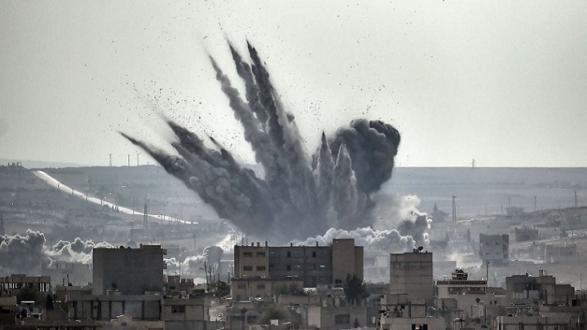In:
Global Beat is your weekly stop for news from around the world. Join us every Friday morning for important stories you should know about.
This week, the United States weighs how to respond to another alleged chemical weapons attack in Syria; tensions increase between Taiwan and China; the Catalonian secession crisis continues; and more.
____________________
Americas
After a day-long standoff with police, former Brazilian President—and most popular politician in Brazil—Luiz Inacio Lula da Silva, known simply as Lula, turned himself in to police following an arrest warrant stemming from corruption charges. Lula, a champion of Brazilian steel workers and founder of the Worker’s Party, was Brazil’s first working-class president and has been sentenced to 12 years in prison for his role in the scandal. Dubbed "Operation Car Wash," the corruption investigation is wide-reaching and touches many of Brazil’s politicians and economic elite, including Petrobras, Brazil’s semi-public oil authority and one of the largest companies in the world.
Also check out:
- California Governor Jerry Brown agrees to National Guard border efforts, but not ‘a mission to round up women and children’ – Los Angeles Times
Central & South Asia
Seven soldiers from Myanmar have been sentenced to 10 years of hard labor for the massacre of 10 Rohingya Muslim men in northern Myanmar’s Rakhine state. The seven soldiers were made up of four officers and three men of other ranks. The military claims that the men killed were terrorists, while the international community believes these killings and ethnic violence have the hallmarks of ethnic cleansing and genocide. A repatriation process of some of the 700,000 Rohingya refugees living in Bangladesh was set to begin in January, but has been repeatedly delayed over concerns of their safety upon returning to Myanmar.
Also check out:
China & East Asia
Tensions between Taiwan and mainland China are on the rise as Beijing and the United States harden their positions on the island. President Trump recently signed the Taiwan Travel Act, encouraging U.S. officials to visit the island and meet with their counterparts. He also approved measures to allow U.S. defense companies to sell technology allowing Taiwan to build state-of-the-art submarines. China has demanded the United States halt these weapons sales and all forms of military partnership with Taiwan. Beijing has also responded with a naval fleet review, several recent massive shows of force, and a vow to prevent any U.S. official going to Taiwan from entering mainland China. Increased tensions as President Xi Jinping consolidates power have renewed fears of armed conflict and a restart of the civil war between the former government that fled to Taiwan and the mainland Chinese government that had risen out of the Maoist revolution.
Also check out:
Europe & Russia
The Spanish federal government is fighting multiple battles related to October’s Catalonia secession crisis. Madrid is currently in talks with Scotland to extradite one Catalan leader, and with Germany to extradite the former president of the region, Carles Puigdemont. Seven more leaders of the independence movement were arrested in Catalonia by the national police. Meanwhile, Spain has not yet approved a budget for 2018. The Basque Country, an autonomous region in Northern Spain which has its own history of secessionist movements, has taken the lead on negotiating a 2018 budget and extracting concessions from both Madrid and Catalonia. However, as long as Prime Minister Mariano Rajoy maintains direct rule in Catalonia (an autonomous region), the Basque government will not support the federal government’s budget proposals.
Also check out:
Middle East & North Africa
Tensions in Syria are soaring after an alleged chemical weapons attack against rebels and civilians by Syrian President Bashar al-Assad, and an alleged airstrike against Iranian forces by Israel. President Trump is mulling further use of force against the Syrian regime, and has lashed out against Russia for supporting Assad. Russia has responded by warning against, but not ruling out, war between the United States and Russia, and warned against further destabilization to Syria. President Trump was scheduled to take a trip to South America, but canceled at the last minute to focus on this developing crisis, instead sending Vice President Mike Pence. President Trump is expected to make a decision on how the United States will respond soon.
Also check out:
- Burning tires, tear gas, and live fire: Gaza clashes turn deadly – The Washington Post
Southeast Asia & Oceania
China has been sending steel to the United States and the West through Vietnam to try to avoid tariffs. The steel is sent to Vietnam, where it is then galvanized and strengthened before being shipped to the United States at prices that undercut what U.S. producers can sell for. The European Union found this to be true back in November, but the United States launched a wider investigation that recently concluded with the same finding.
Also check out:
- The radical plan to split Sydney into three – The Guardian
Sub-Saharan Africa
Sudanese President Omar al-Bashir has ordered the release of all political prisoners. "The release of political prisoners comes to strengthen the spirit of reconciliation, national harmony, and peace created by the national dialogue" and as part of "steps to prepare a permanent constitution for the country," state news agency SUNA said. Many arrests came in January after protests erupted in response to rising food prices, including the price of bread doubling, though opposition leaders have regularly been detained since Bashir first came to power through a coup in 1989. He will not seek reelection in 2020.
Also check out:




